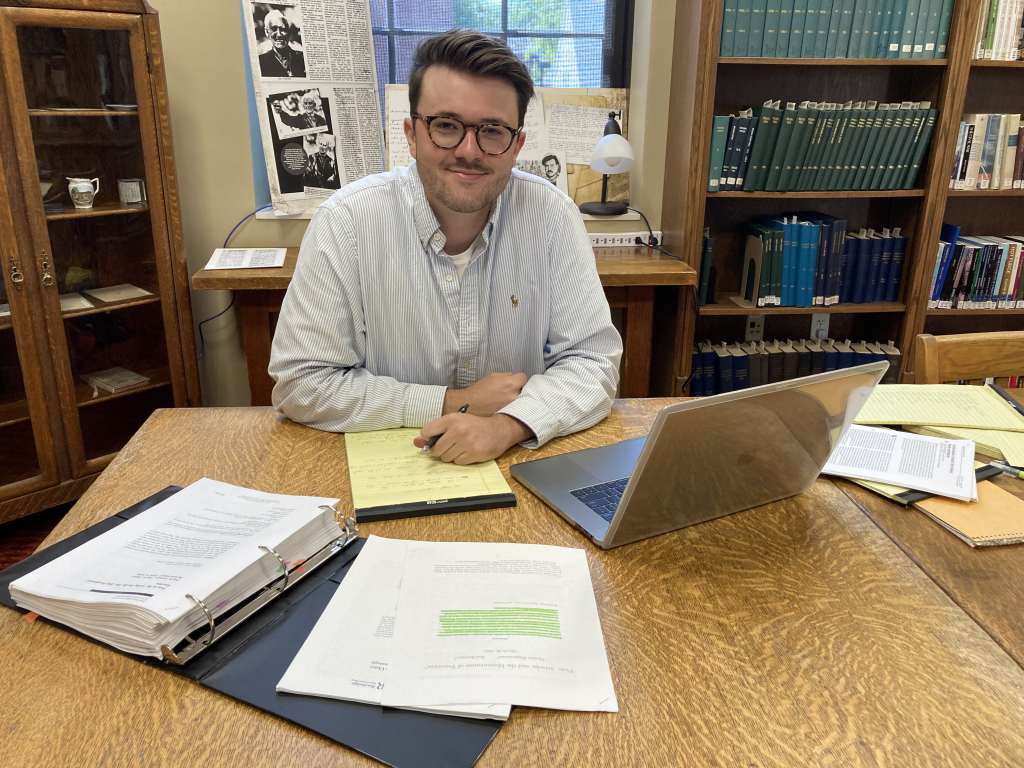
Blake Thomas ’22 — In continuation of my introductory econometrics class, I had an independent study with Dr. Howland to explore intermediate topics in econometrics. The generous mentorship and funding provided by Dr. Howland allowed me to continue studying econometrics as a virtual intern this summer. I would like to thank Dr. Howland for this experience and the continued help he has given me throughout my time at Wabash and as my internship advisor.
In this position, I have worked to create a module on regression discontinuity, adapting materials from the book Mastering Metrics by Angrist and Pischke. My work involved providing a detailed reading guide of empirical papers that use regression discontinuity (RD). RD is a method of determining causal effect between an independent and dependent variable using a cutoff where observations—lying closely on either side of the cutoff—are compared, thus making it possible to estimate the treatment effect in studies in which random assignment cannot be achieved. One such paper used RD design to measure the effects of the Minimum Legal Drinking Age on mortality rates, while another applied RD to basketball statistics, finding that being slightly behind at halftime leads to a discontinuous increase in winning percentages. These papers were collected for their interesting topics and broken down to highlight their use of RD, and to show how causal relationships are established in econometrics.
The other aspect of my internship involved estimating the effects of domestic terrorism on political behavior. Much to my frustration, I struggled to sustain progress with my work due to the complexity of measuring the effects of domestic terrorism. I was left unable to find or gain accessible data and usable empirical strategies that could potentially provide a means of measuring the effects of domestic terrorism, which ultimately led to a near exhaustive review of the relevant literature. Although these issues slowed the progression of the paper, the struggle strengthened my capacity to conduct meaningful research in the face of adversity and improved my understanding of what research entails. Through the mentorship of Dr. Howland, my experience in this internship has prepared me well for my goal of conducting graduate-level research.
The experiences working on these projects established my strengths in data analysis and econometric modeling. Using econometric methods along with spatial data allowed me to understand the causal effect of event proximity on political behavior. This required my proficiency in the statistical software STATA and Arc GIS (a geographic information system application), a skill which I progressively developed throughout my time conducting this research. Additionally, I worked with various data sets such as the Global Terrorism Database, the Current Population Survey (CPS), and the Voter File datasets from Florida, Texas, and North Carolina. Though interested in pursuing graduate work in Political Science; this experience solidified my interest in Political Methodology which will allow me to utilize econometric methods of analysis and apply them to understanding Political Behavior.
Unlike other internships, I spent the majority of my time working in my town’s Public Library due to the nature of the work and the internship being virtual. In the face of the recent pandemic, this experience may not have offered me the experience of a new city but has had the benefit of allowing me to be completely immersed in my work. Again, I extend my tremendous gratitude to Dr. Howland and Wabash for providing this internship opportunity. This experience, although challenging, has been immensely enjoyable and reaffirmed my desire to continue my education in Political Science.